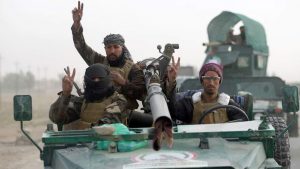The fight over Mosul has reached its peak, as Iraqi forces battle to cut off the escape of ISIS fighters still holed up in the city. These remnants now control four corners of the city, which is all that remains of the much-vaunted Iraqi Caliphate, like reported by china.org.cn .
The most significant event was the militants’ destruction of the historic Al Nuri mosque before most of the fighters fled Iraq to seek sanctuary in the Syrian town of Raqqa, capital of the dwindling ISIS empire. Only a few fanatics remain to make a last stand in Mosul, which is turning into a prolonged siege.
It’s somewhat baffling as to why Mosul is taking so long to liberate. The Iraqi forces operating there are spearheaded by the elite Western-trained special forces. It is also backed up by incessant Western bombing. Usually Western bombing strategy is precision-guided and selective; nonetheless, on this occasion, some elements of the old shock-and-awe campaign is being seen, as over 500 civilians, most of them used as human shields by ISIS, have lost their lives in the offensive.
Although the Iraqi army has given civilians free passage, the strategy has been to control the town center, which has meant that the ISIS forces would have to be clustered in different pockets in the city. Naturally, cleaning-up operations will take time.
That said, no professional military should take over eight months to clean up and control one single city, especially given its monopoly of air support.
And, there’s something else, namely, lack of coordination, and divided interests. Everyone knows that ISIS as an entity is finished. Islamic State, having risen rapidly in the last four years is falling even faster.
Its future as a viable territorial entity is over and it’s only a matter of time before it is wiped off the map. The question is what happens after that? Charles Krauthammer, the veteran Washington Post columnist has described the situation as similar to Europe in 1945, when the Nazi ideology was collapsing and the various advancing allies were seeking to carve out their spheres of influences.
Krauthammer states that this is infact the end of the beginning (to quote from a famous speech by Winston Churchill), for a great civil war will continue. While in some aspects it is true, in other aspects it is even more complicated than that.
The rise of ISIS was a phenomenon directly related to, but not a direct result of the allied invasion of Iraq. The Baath Party, was for all its faults, a secular and authoritarian party, which imposed order over a broad swathe of the Middle East.
From Libya to Egypt, to Iraq and Syria, Baathists combined socialism and Arab nationalism and secularism. However, in Iraq, the process of eliminating Baathist influence was vicious and the disbanding of the Iraqi army and bureaucracy provided ready-made recruits later swelling the ranks of ISIS.
As political science research shows, this is what happens when stakeholders are forcibly kicked out – they go underground and fuel an insurgency.
Now, the character of ISIS itself is a matter of debate yet to be settled; however, overall, if one ascribes the character of a theocratic revolutionary state, then in some ways, the fall of ISIS automatically implies a power vacuum, where stakeholders are varied and undefined.
Added to this is the role of geopolitics. The Gulf situation is heating up and there is a strong chance of a regional war over Qatar and Syria. The fact that we are now seeing so many direct confrontations between different proxies and militias backed by different great powers is because the ISIS region is collapsing and the rush to Raqqa has started.
Iran for example wants a land bridge from Teheran to the Mediterranean. After all, carving out a Shiite crescent has always been a grand Iranian strategy. Similarly, Russia wants a rump Syria to survive, so it can have a naval and air bases and a future influential stake in what remains of the country, while the Americans want to carve out a zone for the Kurds, to which the Turks are bitterly opposed.
All this rush to make territorial gains mean the powers and their proxies operating in close proximity, and with a chance of more and more clashes and conflicts.
Perhaps that’s the tragedy and irony of the entire situation. ISIS was a brutal regime, and it was inevitable that the forced punitive order it created would collapse. Yet, that’s not creating a better, more peaceful place; in some ways, there will be even more bloodshed for the long-suffering civilian population to endure.
The final and most brutal part of the regional war is yet to come. And that could affect the energy supply chain across the world, with ramifications for everyone.



